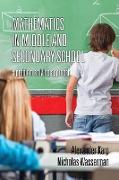- Start
- Mathematics in Middle and Secondary School
Mathematics in Middle and Secondary School
Angebote / Angebote:
The experience and knowledge acquired in teacher education courses should build important fundamentals
for the future teaching of mathematics. In particular, experience in mathematical problem solving, and in
planning lessons devoted to problem solving, is an essential component of teacher preparation. This book
develops a problem solving approach and is intended to be a text used in mathematics education courses (or
professional development) for pre-service or in-service middle and secondary school teachers. It can be used
both in graduate and undergraduate courses, in accordance with the focus of teacher preparation programs.
The content of the book is suited especially for those students who are further along in their mathematics
education preparation, as the text is more involved with mathematical ideas and problem solving, and
discusses some of the intricate pedagogical considerations that arise in teaching. The text is written not as an
introduction to mathematics education (a first course), but rather as a second, or probably, third course. The
book deals both with general methodology issues in mathematics education incorporating a problem solving
approach (Chapters 1-6) and with more concrete applications within the context of specific topics - algebra, geometry, and discrete mathematics
(Chapters 7-13).
The book provides opportunities for teachers to engage in authentic mathematical thinking. The mathematical ideas under consideration build on
specific middle and secondary school content while simultaneously pushing the teacher to consider more advanced topics, as well as various
connections across mathematical domains. The book strives to preserve the spirit of discussion, and at times even argument, typical of collaborative
work on a lesson plan. Based on the accumulated experience of work with future and current teachers, the book assumes that students have some
background in lesson planning, and extends their thinking further. Specifically, this book aims to provide a discussion of how a lesson plan is
constructed, including the ways in which problems are selected or invented, rather than the
compilation of prepared lesson plans. This approach reflects the authors' view that the process of
searching for an answer is often more important than the formal result.
Folgt in ca. 10 Arbeitstagen
